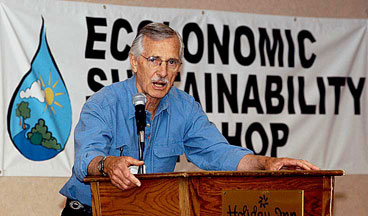
"If everyone followed in the tracks I made, would I be satisfied with where I took them." That is a question posed by Dennis Weaver, Emmy Award-winning actor, environmental activist and keynote speaker at the first Ecolonomic Sustainability Workshop held in Joplin yesterday. Hosted by Anna Wyman and Robert Wood of Sustainable Ideas, Inc. (SII), the workshop kicked off the 2004 Missouri Recycling Association (MORA) Conference which will run through June 10. Weaver, who always has a kind word for his hometown of Joplin, was given a plaque by Jane Wyman (no relation to the actress), a member of the Board of Governors of Missouri Southern State University. It recognized his role in fostering environmental issues locally.
Ecolonomics is a word coined by Weaver that means maintaining our natural resources (our ecology) at their present level or better in ways that are economically sound. SII, based in Southwest Missouri, is an independent company with an interest in connecting those working toward sustainability in Missouri and in educating the public about the sustainable products and services available to them.
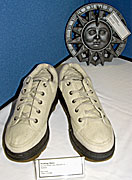
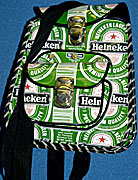
Real Goods of Ukiah, CA 65482 is the producer of both the walking shoes, at left, and the backpack, at right. The shoes are made out of recycled materials, rubber for the soles and canvas for the uppers. The shoe-laces are made out of hemp, a natural fiber. The backpack is made out of recycled aluminum cans and is quite a conversation piece.
The celestial sundial appearing behind the shoes was made out of "states metal" (recycled aluminum) and was produced by Tomorrow's World of Norfolk, VA 23503. All of the products represent the reuse of materials to protect the environment and to benefit society.
101 Nobel Prize Laureates who met in 1992 at a Union of Concerned Scientists can't all be wrong, Weaver said, when they warned of what lies ahead if we don't change the way we relate to the earth. And how do we relate but through business: growing, manufacturing, selling, transporting and building things. While Weaver said that he was really "jazzed...stoked about people who want to give kids a future we don't have now," he warned that there can be no significant changes made without the input of business. To avoid what he called "environmental suicide," we must make one major change. We need to end our dependence on fossil fuel.
"Fossil fuels support business now but oil is not sustainable," Weaver pointed out. "In the long term it would be impossible to sustain these businesses."
He called attention to our expotential demand for oil and called the need for conservation of resources "extremely important to give us transition time" to consider other options like biomass, energy from the oceans, and the use of acetylene or hydrogen as alternatives to the use of fossil fuel.
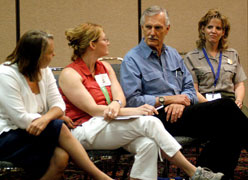
Dennis Weaver presents his concept of ecolonomics to participants at a workshop held in Joplin yesterday. To the right of him is Lana Henry, supervisory park ranger at the George Washington Carver National Monument in Diamond.
There was "no power cord long enough to reach from the coal-fired power plant to the space station in the sky," Weaver noted. He praised Shell Oil for its research in the use of hydrogen, the fuel that lifts rockets into the air.
In justifying the use of hydrogen, Weaver said that it is clean and inexhaustible; that innovation in its use would give the economy a boost allowing satellite businesses to pop up; that creating our own fuel source and supply would strengthen our national security currently at risk for its reliance on foreign oil; and that a hydrogen global economy would promote peace eliminating the conflicts created by the uneven distribution of oil.
What Weaver called for were models of alternative sources of energy. He briefly mentioned Howard County, Missouri as the first ecolonomic county in the U.S. but talked at length about one of his pet projects-- Angel's Nest in Taos, NM, a health, rejuvenation, yoga center, a self-sustained community containing the first hydrogen fueling station and use of a Hummer Limo driven by hydrogen fuel created by Russel J. Gehrke as part of Dennis Weaver's International Hydrogen Drive 2004.
Another ecologically sound principle at Angel's Nest involves the use of water. Weaver described how the buildings were designed to catch water run-off in cisterns, that this "gray water" was pumped into the fields growing fruits and vegetables, then re-used to flush toilets and finally dispersed as liquid fertilizer for the landscape.
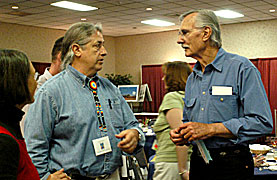
Weaver, at right, discusses problems with Grand Lake with Earl Hatley, a local Riverkeeper. Another group focusing on the problems of water quality issues is L.E.A.D. Agency, Inc. Its director, Rebecca Jim was a member of the workshop audience.
"Water is going to be a resource we are going to be fighting for," Weaver cautioned. "We are using it up faster than nature is supplying it."
He was optimistic that we could make a Garden of Eden on this planet by using the technology that has created problems for solving problems, but it would depend upon whose hands the technology was in. "Hitler and Stalin had good technology," Weaver reminded us.
Weaver said that the most important environment needing clean-up was our inner environment, not what we experience through our five senses but what we truly are, the core of our being or our hopes and dreams. He believes that spirituality is more than attending church but a sense of human beings living inter-connected, sharing each other's pain and joy. He sees the need for a shift in collective consciousness. As creators on this planet, we are the only species with the power to undo the mess we created.
Quoting his favorite philosopher, Pogo, a comic strip character from the late '40s and early '50s, Weaver said, "We have met the enemy and they is us" but he also had hopes for a brighter tomorrow, if only we can curtail our materialistic goals.
"You destroy the environment, you destroy jobs," Weaver noted. "People don't seem to get this."
Local speakers address issues
Lana Henry, supervisory park ranger at the George Washington Carver National Mounument in Diamond, led off with a discussion of how recycled materials are utilized at the center. Henry, who received the 2000 Freeman Tilden Award for developing a hands on science discovery center for grades K-8, also promoted the use of old tires/crumb rubber for a walking trail there.
A member of the Waterkeepers Alliance specifically trying to monitor the Grand Lake Watershed, Earl L. Hatley of Oklahoma told of how contaminants of lead, cadmium, iron, and zinc from Missouri and Kansas have affected the Spring River which feeds Grand Lake more detrimentally than those entering the Neosho River fed by Tar Creek. Piloting his boat Gadugi (Cherokee for "others in need"), he patrols the waterways around Grand Lake cautioning fishermen about the need to filet any fish they plan on eating and not to exceed a limit of six 8 oz. filets each month due to the level of contaminants found especially in the fatty and bony parts of the fish. He hopes to fix the problems of Grand Lake--silted in phosphorus from poultry waste and heavy metals--by using Superfund money to dredge the lake to remove the sediment channel. He wants people to be more aware of issues dealing with the health of the lake and to change their behaviors that add to the lake's contamination.
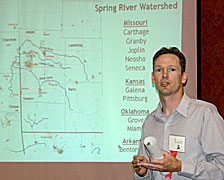
Tony Robyn points out the areas affected by the Spring River Watershed. The new Audubon center intends to assume responsibility for protecting this vital water area.
Speaking on behalf of the proposed Wildcat Glades Conservation and Audubon Center, director Tony Robyn, compared his Audubon group to that of Andrew Carnegie with the caveat that his group were for environmental literacy. "Audubon connects people to something," he said. "We want to get people outdoors, hands-on, as a catalyst for conserving nature. Besides preserving the globally unique chert glades found in the park, the center hopes to steward the Spring River Watershed encompassing 2400 square miles in a 4-state regional program. In July he said architects will be hired to plan a 12,550 ft. "green" facility that will be sited within 160 acres, a perfect setting for promoting environmental education. In the middle of a capital campaign, the center still needs to raise $2.5 million in order to break ground by early spring 2005.
Dr. John Lamberton, an environmental consultant from Tulsa, discussed the need for environmental management planning. He dissed Wal-Mart for creating a consumption society where people believe that if something breaks, throw it away and get a new one rather than valuing sustainability. He believes that people can be re-socialized but not through laws, which should only be a safety net for those who can't be socialized.
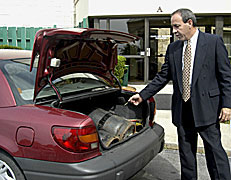
Marco Tapia points to tanks containing acetylene. The car he drove from Columbia, MO ran on a mixture of that gas and alcohol. The alternative fuel is the outcome of a process using biomass that BioDiverse Energies hopes to market.
Representing a new concept in the conversion of waste to energy were Marco Tapia and Dave Seidel of BioDiverse Energies, Inc. of Columbia, MO. Their model, they say, will provide affordable energy for communities converting regional biomass resources and at the same time to revitalize an otherwise dying area. They are looking for grant money to help them build their first facility in Missouri.
Peter La Vaute, managing member of Ecosense Solutions, was the lead-in to a round table discussion led by Nii Abrahams, professor of economics at Missouri Southern. La Vaute, who said we were "living in the dregs of the party," and that we as individuals fostering ecolonomics need to shift over to a "win, win, win side." Education should be at the core of what we should be doing and that we need to develop an awareness of how everything we do affects everything else. His Ecosense Solutions seeks out new ways to use materials and to create a new economic paradigm whereby educated children can find jobs at home in rural areas. He even suggested that we might need a catastrophe to wake people up to the environmental issues that need to be addressed now. "We have developed a culture of using energy," he said. We are "continually buying pollution when we buy things long distance. The best energy technology is to "cut down on use. Our culture is being emulated by cultures like China; it's scary that the model we've created leads to doom."
Audience remains cynical
The concensus of the audience during the round table discussion was that there was no leadership at the top to keep things moving environmentally, that most politicians can be bought, that the media produces a white-washed weird view of the world, and that making a connection between environmental issues and health might be the only way to override people's concerns that reform might hit them too hard in the pocketbook.
To counter this cynicism, Weaver suggested that a shift in consciousness could be possible. He cited what he called "the blessing of the Internet" where people could speak to each other to combat the voices of the media and corporations that might stand in the way of change.
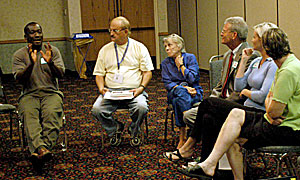
Nils Abrahams at left, professor of economics at Missouri Southern, leads an open forum discussion on issues relating to the destruction of our environment.
Prof. Abrahams chided the school systems for graduating students who do not understand these issues. He believes that ecolonomic concepts should be taught in every subject, even in English classes. We must educate the young mind which is like a sponge and open to new ideas. And an audience member agreed. Use the "pester power" of kids to convince their parents of the needed changes.
Weaver leads life he preaches
Dennis and his wife Gerry live in Ridgeway, CO in an environmentally sensitive, energy-saving Earthship. Gerry especially is excited when she describes their home and how it is constructed of 300,000 aluminum cans that were used to create small walls and 3,000 used tires packed with dirt that were made into bricks rammed together to form mass for the structural walls.
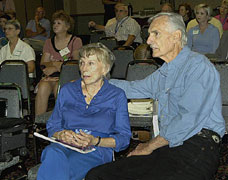
Gerry and Dennis Weaver focus their attention on one of several technical session leaders at the first annual Ecolonomics Conference on Sustainability held at the Holiday Inn in Joplin.
Born in St. Louis, Gerry related how she "came to Joplin "at the age of 6 to find Dennis". The petite but feisty Mrs. Weaver met her husband at the age of 17 when they both were students at Joplin Community College, the predecessor to Southern. They have been married for 58 years.
Tragedy struck the Weaver family when Lynne Weaver, their daughter-in-law-- wife of Rob Weaver and mother to Jennifer--was killed at the Santa Monica, CA Farmer's Market after an 86 year old man lost control of his vehicle, killing 10 and injuring 50. Gerry was spooked later on when she discovered that the license plate on their hybrid car contained the numerical month and day of Lynne's birth. It also reads, "Colorado...Respect Life."
Pictues of the home and a first person account of Dennis' life are found in All the World's a Stage published by Hampton Roads in 2001. Dennis is currently working on his second book.
Photos by Vince Rosati & Mari Winn Taylor
To view these pictures, click on each thumbnail for a larger version.
|
|
|
|









Comments